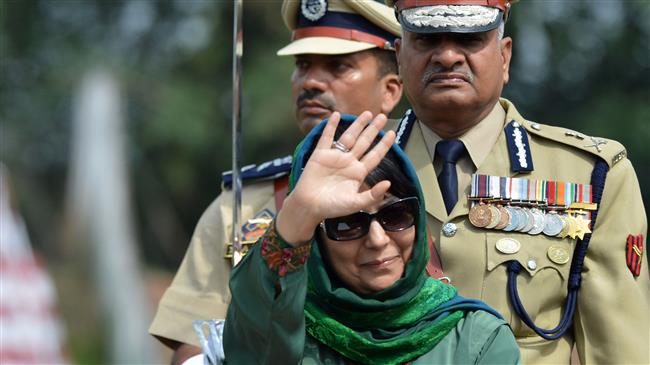Alwaght- India extended six-month imprisonment of four political leaders in the disputed Kashmir region under a draconian law that allows their continued captivity without charge for two years.
The latest detention order against two former chief ministers of India’s only Muslim majority state, Omar Abdullah and Mehbooba Mufti, as well as two regional party leaders, Ali Mohmmad Sagar and Sartaj Madni, was issued by New Delhi under the disputed Public Safety Act (PSA) in a bid to further suppress dissent after the central government stripped the region of its autonomy last August, two senior officials said Friday.
Mufti’s daughter Iltija Mufti confirmed her mother’s continued captivity under the law in a Twitter posting.
“Slapping the draconian PSA... is expected from an autocratic regime that books nine-year-olds for ‘seditious remarks’. Question is how much longer will we act as bystanders as they desecrate what this nation stands for?” Iltija wrote in the tweet.
The four leaders were originally held under a law that allowed a maximum of six months of captivity without charges, but since their detention was about to expire, Indian officials invoked the PSA to keep them under arrest.
“The law does not allow preventive detention beyond six months. So they had to be either released or booked under PSA,” said one government official in Srinagar.
A second official said several other regional leaders who have also completed six months under preventive detention are likely to be booked under the PSA.
The PSA was introduced in the 1970s to prevent timber smuggling in Kashmir but since the uprising in the Himalayan region erupted in 1989, it has been used to arrest and jail thousands of local people, according to activists.
UK-based rights group, Amnesty International, has censured the PSA as a “lawless law.”
Dozens of other politicians, lawyers, trade unionists and activists, were detained across India in August. Some have been released gradually in recent weeks.
India’s Prime Minister Narendra Modi has said the crackdown in Kashmir is aimed at bringing peace to the restive region where tens of thousands have died so far in a three-decade old uprising.
India’s Supreme Court chided the federal government last month for shutting down the Internet and telecommunications in the disputed state.
A ban on public meetings, however, remains in place, though the surging unrest seen in the weeks after Modi’s government stripped Kashmir of its autonomy has died down, and an uneasy calm appears to prevail amid a heavy security presence.
Pro-independence fighters have been battling nearly 500,000 Indian troops in the majority Muslim territory, demanding autonomy or to join Pakistan, which also controls part of the Himalayan region.
Kashmir has been at the heart of two of the three wars fought by India and Pakistan since independence in 1947, and the dispute between the two nuclear-armed neighbors over the Himalayan region remains unresolved.



























